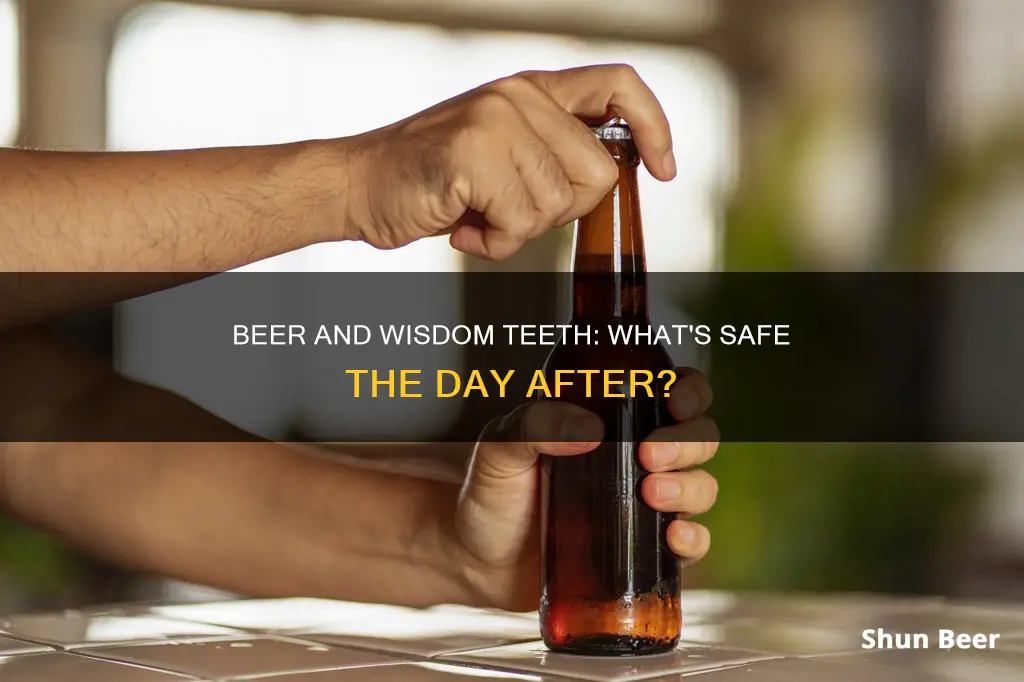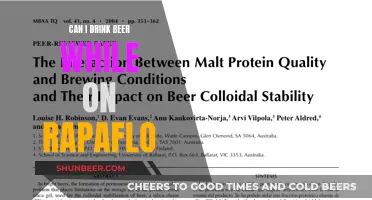
It is generally recommended to wait at least 48 hours before consuming alcohol after wisdom teeth removal. Alcohol can negatively impact the healing process and may cause post-operative bleeding by interfering with the formation of blood clots. It can also increase the risk of dry sockets, a common complication of wisdom teeth removal. Additionally, consuming alcohol while taking prescription painkillers can lead to adverse effects such as liver damage, impaired motor function, and overdose. To ensure a smooth recovery, it is best to follow the advice of your dentist or oral surgeon and avoid alcohol for the recommended period.
| Characteristics | Values |
|---|---|
| How long should you wait before drinking beer after wisdom teeth removal? | It is recommended to wait for at least 48 hours before drinking beer after wisdom teeth removal. If you are taking prescription medication, you should wait for at least 7 days. |
| Why should you wait? | Drinking beer can disturb the blood clot, leading to increased bleeding. It can also cause post-operative bleeding, which will prevent the proper blood clot from forming in the surgery site. |
| What are the other adverse effects of drinking beer after wisdom teeth removal? | Impaired blood clotting, drug-alcohol interactions, and a burning sensation. |
What You'll Learn
- Drinking alcohol after wisdom teeth removal can cause post-operative bleeding
- Mixing alcohol with pain medication can be dangerous
- Alcohol can negatively affect the body's ability to heal
- Drinking alcohol can increase the chances of developing dry socket
- It is recommended to wait at least 48 hours before consuming alcohol after wisdom teeth removal

Drinking alcohol after wisdom teeth removal can cause post-operative bleeding
It is strongly recommended that you wait at least 48 hours before consuming alcohol after wisdom teeth removal. Drinking alcohol before the initial 24 hours can cause post-operative bleeding, preventing the proper blood clot from forming in the surgery site. The formation of a blood clot is crucial to stop excessive bleeding. If a blood clot is not formed properly in the surgery site, a dry socket can occur. Drinking alcohol can increase the chances of dry socket, which is one of the most common complications of wisdom teeth removal.
The socket will cause an ache or throbbing pain in the gums or jaw, similar to a toothache. There may also be a foul-smelling odour in the empty socket, and exposed bone may be visible. Typically, a dry socket occurs 3 to 5 days after surgery if a patient fails to follow the dentist's instructions.
Additionally, if you have been prescribed painkillers after your wisdom teeth removal, drinking alcohol can have serious side effects. The combination of pain medication and alcohol can cause liver damage, impair driving, and increase the risk of falls or injuries. It is best to avoid alcohol until you have finished taking your prescribed painkillers.
To ensure a smooth recovery, it is important to follow the post-operative instructions provided by your dentist or oral surgeon. This includes getting proper rest, controlling any bleeding, drinking plenty of liquids, avoiding drinking from a straw, and taking any prescribed medications.
Actors Drinking Alcohol in Commercials: Is It Allowed?
You may want to see also

Mixing alcohol with pain medication can be dangerous
It is recommended to wait at least 48 hours before drinking alcohol after wisdom teeth removal. In the first 24 hours, your mouth will need to rest and heal, and drinking alcohol can disrupt this process by preventing blood clots from forming and causing post-operative bleeding. If you've been prescribed painkillers, it's extremely important to avoid alcohol, as mixing the two can have serious side effects, including liver damage, impaired motor function, dizziness, overdose, and even death.
Additionally, alcohol can worsen the side effects of certain painkillers. For example, when combined with opioids like codeine, hydrocodone, or oxycodone, alcohol can worsen drowsiness and cause breathing problems, which can be life-threatening. Similarly, mixing alcohol with NSAIDs like ibuprofen or naproxen can increase the risk of stomach bleeding and ulcers. Acetaminophen (Tylenol) combined with alcohol can also lead to severe liver damage, especially if consumed regularly over the long term.
It's important to read the labels on your medications and follow the instructions carefully. If you have any doubts or questions about how alcohol might interact with your medication, it's best to consult your doctor, pharmacist, or another healthcare provider.
Beer Drinking Rules in North Carolina's Parks
You may want to see also

Alcohol can negatively affect the body's ability to heal
It is best to avoid alcohol for at least 48 hours after wisdom teeth removal. In the first 24 hours, your mouth needs to rest and heal, allowing blood clots to develop and bleeding to stop. Alcohol can negatively affect the body's ability to heal as it can disturb the blood clotting process and cause increased bleeding. Studies have shown that even a slight increase in acidity from a pH of 7.4 to 7.0 can increase the clotting time and decrease the clot's firmness. This, in turn, can lead to dry sockets, a common complication of wisdom teeth removal.
Additionally, if you have been prescribed painkillers, drinking alcohol can have serious side effects. The combination of pain medication and alcohol can cause liver damage, impair driving, and increase the risk of falls or injury. It is important to follow the post-operative instructions provided by your dentist or surgeon to ensure efficient healing.
The consumption of alcohol can also cause a burning sensation in the extraction site, similar to the sting of rubbing alcohol on an open wound. The more concentrated the alcohol, the worse the burning sensation is likely to be. Therefore, it is advisable to avoid alcoholic beverages, especially during the initial stages of recovery, to give your body the best chance to heal.
While you may be eager to resume your normal diet and indulge in an alcoholic beverage, it is important to be patient and follow the recommendations of your healthcare provider. A soft or liquid diet is recommended for the first few days after tooth extraction, and alcohol can disrupt the vital clot formation that occurs during this time. By focusing on nutritious, soft foods and staying well-hydrated, you can support your body's natural healing process and ensure a swift recovery.
Drinking Beer Post-Plasma Donation: What You Need to Know
You may want to see also

Drinking alcohol can increase the chances of developing dry socket
It is generally recommended to avoid drinking alcohol for at least 48 hours after wisdom teeth removal. During the initial 24 hours, it is crucial to let your mouth rest and heal, allowing blood clots to develop and prevent excessive bleeding. Mixing alcohol with any prescribed painkillers can also lead to serious side effects, including liver damage and impaired motor function. Therefore, it is best to refrain from alcohol until you have completed your course of medication.
Drinking alcohol too soon after wisdom teeth removal can increase the chances of developing dry socket, a painful condition that occurs when the blood clot at the extraction site becomes dislodged or fails to form. Dry socket leaves the nerves and bone exposed, causing severe pain and slower healing. This condition typically arises 3 to 5 days after surgery if post-operative instructions are not followed.
Alcohol consumption can disrupt the formation of the blood clot, leading to dry socket. Additionally, drinking through a straw is also a risk factor for dry socket due to the suction force that can dislodge the clot. It is recommended to wait at least 7 days before drinking through a straw to reduce the risk of dry socket.
To prevent dry socket and promote proper healing, it is important to follow your dentist's instructions and maintain good oral hygiene. Eating soft foods, rinsing gently with saltwater, and keeping the surgical site clean are all recommended practices to aid in recovery. Avoiding risk factors such as smoking, drinking alcohol, and using straws can also reduce the chances of developing dry socket after wisdom teeth removal.
Does Helium-Infused Beer Really Work?
You may want to see also

It is recommended to wait at least 48 hours before consuming alcohol after wisdom teeth removal
It is highly recommended that you wait at least 48 hours before consuming alcohol after wisdom teeth removal. This is because the first 24 hours post-surgery are critical for resting and healing. During this time, your mouth needs to develop blood clots to stop the bleeding. Alcohol can disturb this process, leading to increased bleeding and the risk of dry sockets.
Drinking alcohol within the first 48 hours can also cause serious side effects when mixed with prescribed painkillers, which are often necessary to manage post-operative pain. The combination of alcohol and painkillers can lead to adverse reactions, such as liver damage, impaired motor function, dizziness, and overdose. It is crucial to follow the instructions provided by your dentist or oral surgeon to ensure a safe and smooth recovery.
In addition to alcohol, it is best to avoid acidic, carbonated, and hot drinks for at least a week after wisdom teeth removal. Beverages high in citric acid, such as lemonade and orange juice, can irritate the surgery site and lead to infection. Hot drinks, including coffee, should be avoided for at least 48 hours, as they can also disrupt the healing process.
While it may be challenging to refrain from alcohol and other restricted beverages, it is important to prioritize your recovery and follow the recommendations of your dental team. This will help ensure a swift and successful healing process, reducing the risk of complications and promoting optimal oral health.
If you have any doubts or questions about alcohol consumption after wisdom teeth removal, it is always best to consult with your dentist or oral surgeon. They can provide personalized advice and ensure that you have all the information you need for a safe and comfortable recovery.
Beer and the Flu: A Safe Mix?
You may want to see also
Frequently asked questions
No, it is recommended to wait at least 48 hours before consuming alcohol after wisdom teeth removal.
Drinking alcohol can disturb the blood clotting process and cause post-operative bleeding, hindering the healing process. It can also have serious side effects when mixed with prescribed painkillers.
It is best to stick to a soft or liquid diet for the first few days after wisdom teeth removal. Recommended drinks include water, teas, electrolyte-rich beverages, milkshakes, apple juice, ginger ale, and smoothies.
In addition to alcohol, it is best to avoid acidic, carbonated, and caffeinated drinks, as well as very hot or cold beverages, as these can disrupt the clot formation and irritate the surgical wounds.







